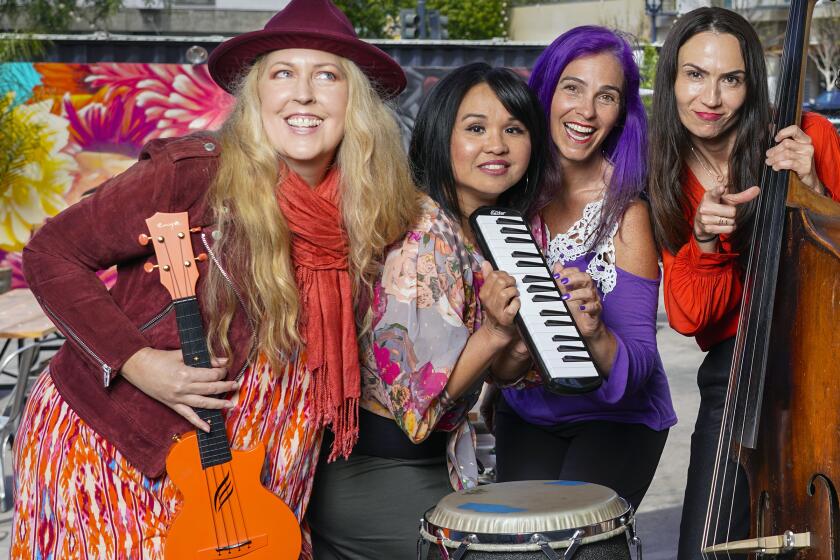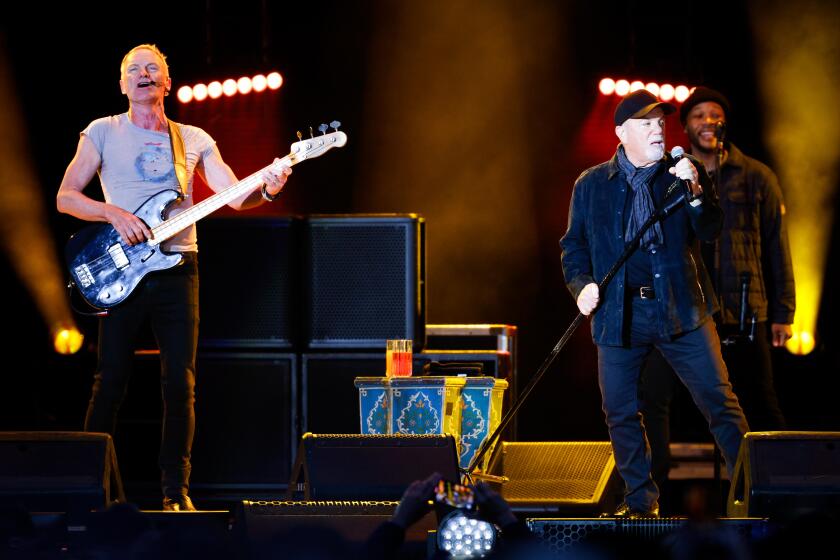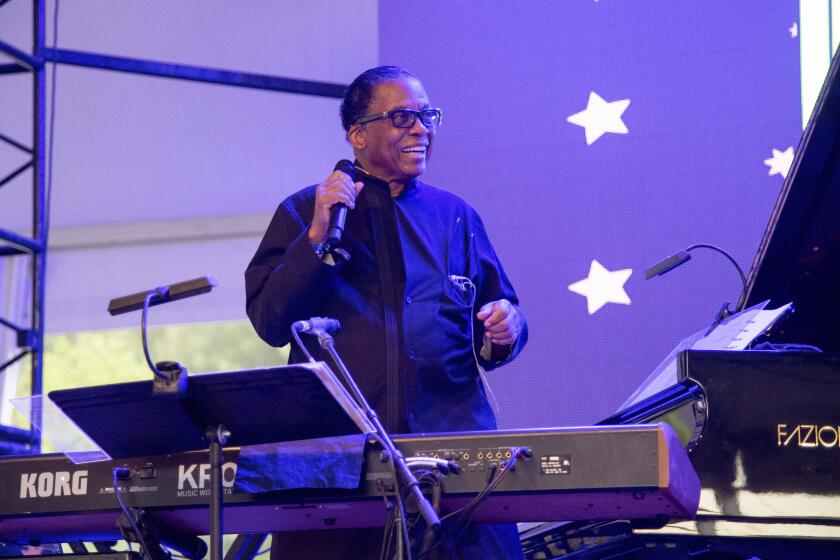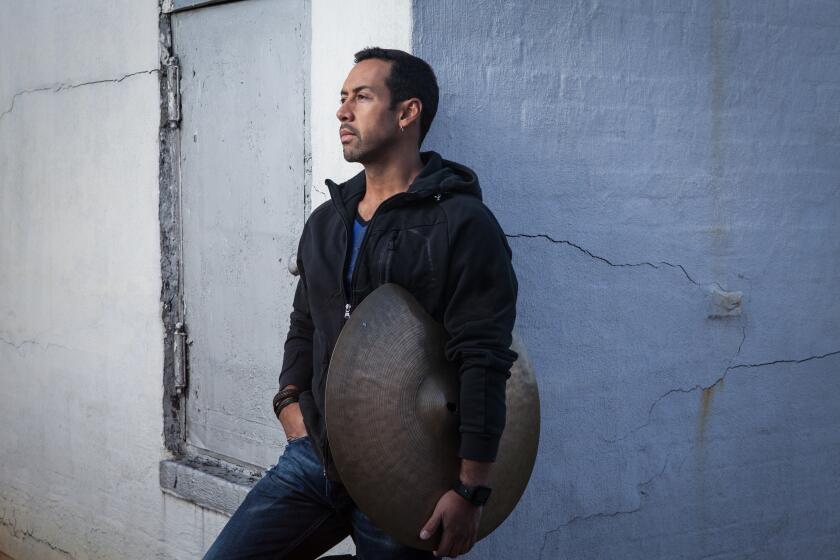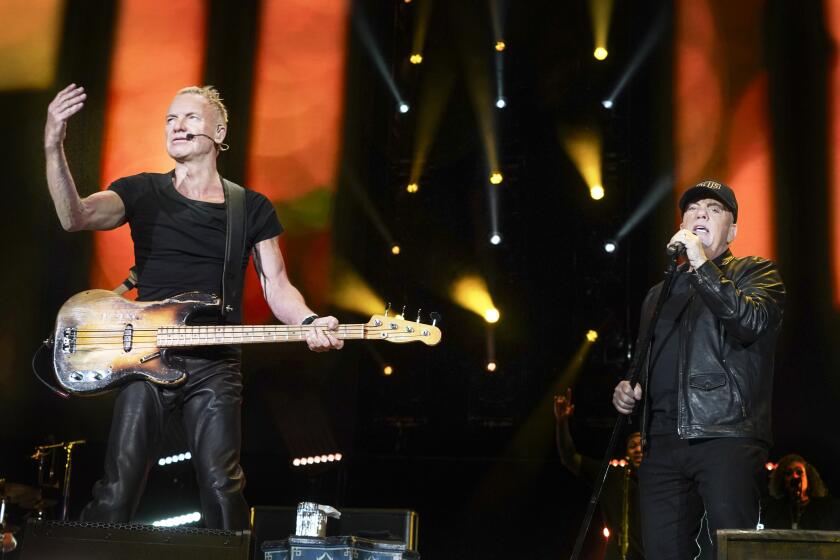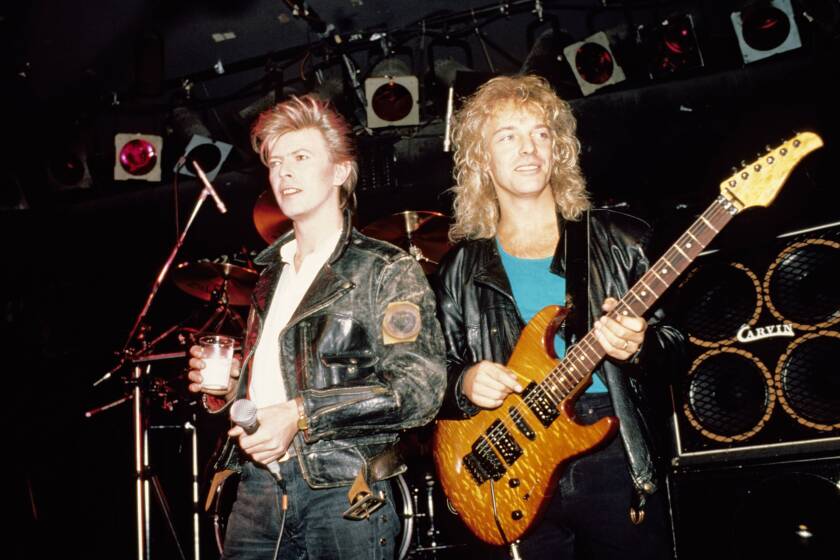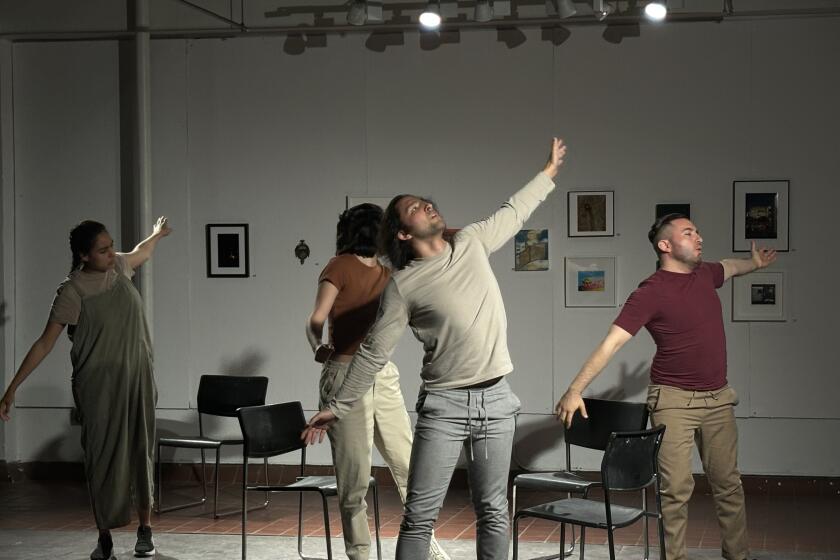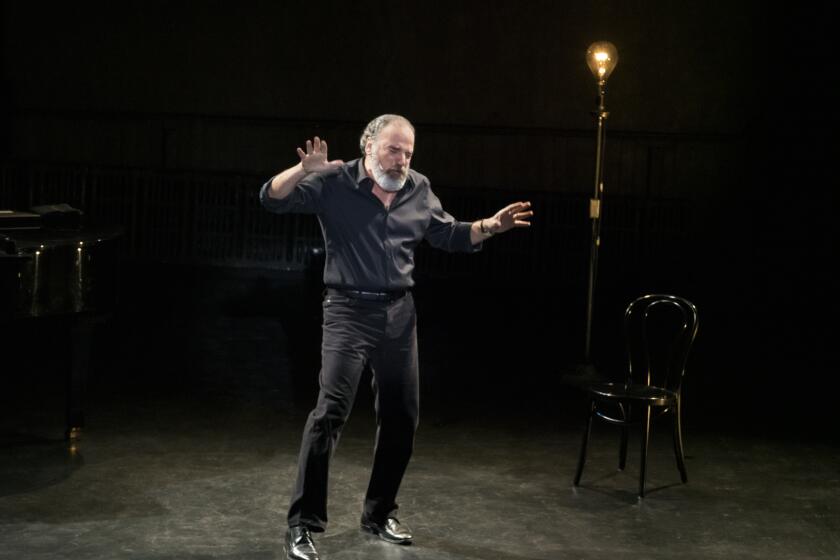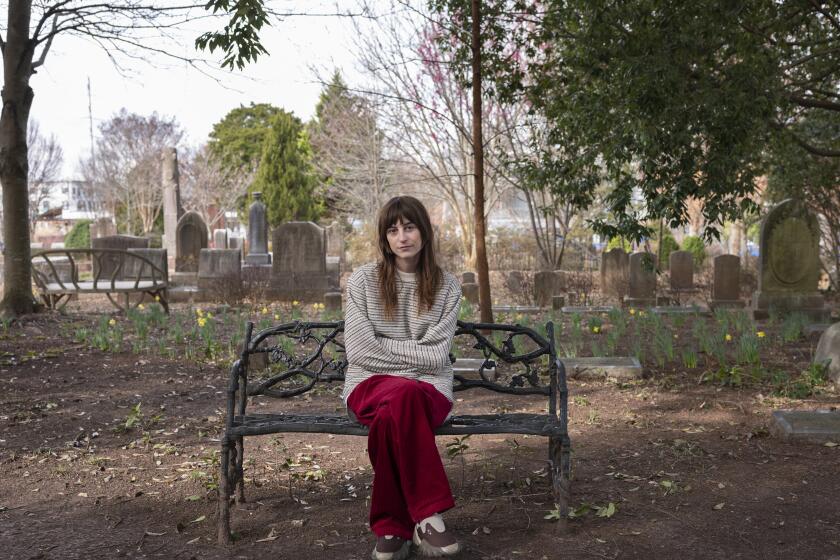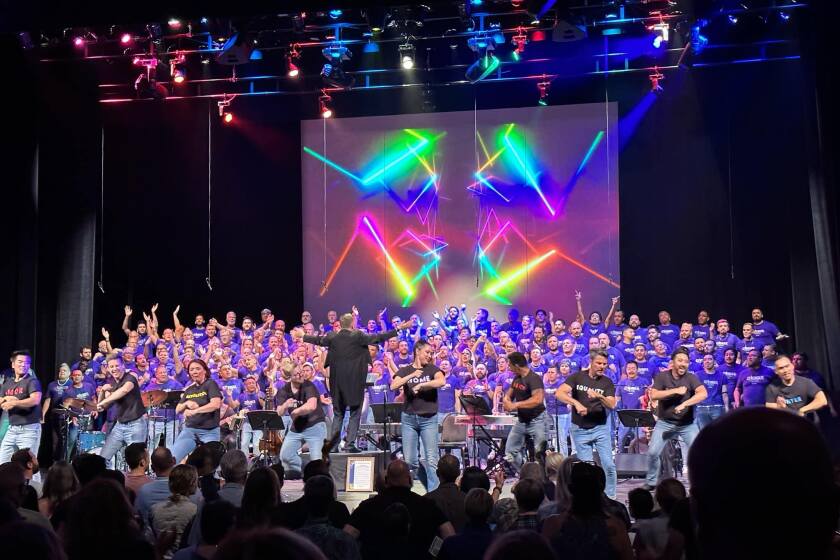Angélique Kidjo is a vocal dynamo in any language (and she speaks 10 of them)
Grammy Award-winning vocal dynamo Angélique Kidjo speaks 10 languages, including four from her West African homeland of Benin. That’s just one reason her electrifying singing transcends musical and geographical borders alike.
“When I was 7, I told my mother I wanted to be James Brown!” said Kidjo. “When I was 8, I decided I was going to pay tribute to Jimi Hendrix.”
Now 57, Kidjo still salutes Hendrix with her stunning, a cappella renditions of his classics “Voodoo Child (Slight Return)” and “Machine Gun.” But trying to pin her down stylistically is impossible, as befits a woman whose collaborators have ranged from Carlos Santana, Alicia Keys, Peter Gabriel and U2’s Bono to Herbie Hancock, Brazil’s Gilberto Gil, Cuba’s Omara Portuondo and Senegal’s Youssou N’Dour.
Kidjo performs here next Sunday, Aug. 13, with the San Diego Symphony, as part of its Bayside Summer Nights concert series at Embarcadero Marina Park South.
On Wednesday, she’ll be at the 18,000-capacity Hollywood Bowl for “Angélique Kidjo’s Tribute to Salsa,” an homage to the late vocal legend Celia Cruz. She’ll repeat her heartfelt Cruz tribute Sept. 6 in Paris and Sept. 17 at the Monterey Jazz Festival.
In between her orchestral concerts and salsa homages this summer, Kidjo has been doing live preview performances of her upcoming new album, which finds her reinventing Talking Heads’ “Remain in Light.”
That landmark 1980 art-rock album drew much of its polyrhythmic inspiration from African music. Kidjo is inverting that equation by adding new African melodies and words, a Senegalese drum quartet, the brass section from the acclaimed Brooklyn Afrobeat band Antibalas, and — at her May 5 Carnegie Hall concert — a vocal cameo by former Talking Heads’ leader David Byrne.

Proudly singing out
“Since moving to America, I have realized the impact of the music of Africa,” Kidjo said. “The drums were taken away from the slaves. But we had the voice.
“Here in America, we had the blues and then jazz. We are all Africans.”
Kidjo was at the San Diego Hilton Bayfront in late April to give the keynote address at the YWCA of San Diego County’s annual “In the Company of Women” benefit luncheon.
A longtime UNICEF Goodwill Ambassador and co-founder of the nonprofit Batonga Foundation for Girls Education, she punctuated her speech here with unaccompanied songs in at least three languages. Kidjo also led the hundreds of attendees in spirited vocal call-and-response exchanges that underscored the universality of music.
“For me, it’s always the same thing, just a different setting and a different audience. And, sometimes, the audience overlaps,” she said during a subsequent interview in an airy alcove at the Hilton. Nearby, her French musician husband, Jean Hébrail, was on his cell phone, finalizing their travel arrangements.
A short, petite woman, Kidjo has a big, richly expressive voice that soars in almost any setting. Yet, while her music draws from a panoply of styles from around the globe, she bristles at the oft-used term World Music.
Or, as Kidjo put it after winning Best Contemporary World Music Album honors at the 2008 Grammy Awards: “One thing that always disturbs me is categorizing everything. For me, a human being is not a matter of color. But stupidity is universal, whatever direction you go.”
One of her upcoming projects will honor three iconic singers — Cruz, Miriam Makeba and Nina Simone. She credits Makeba, whom she befriended in Paris in 1989, for helping her realize World Music was not an innocent marketing tool.
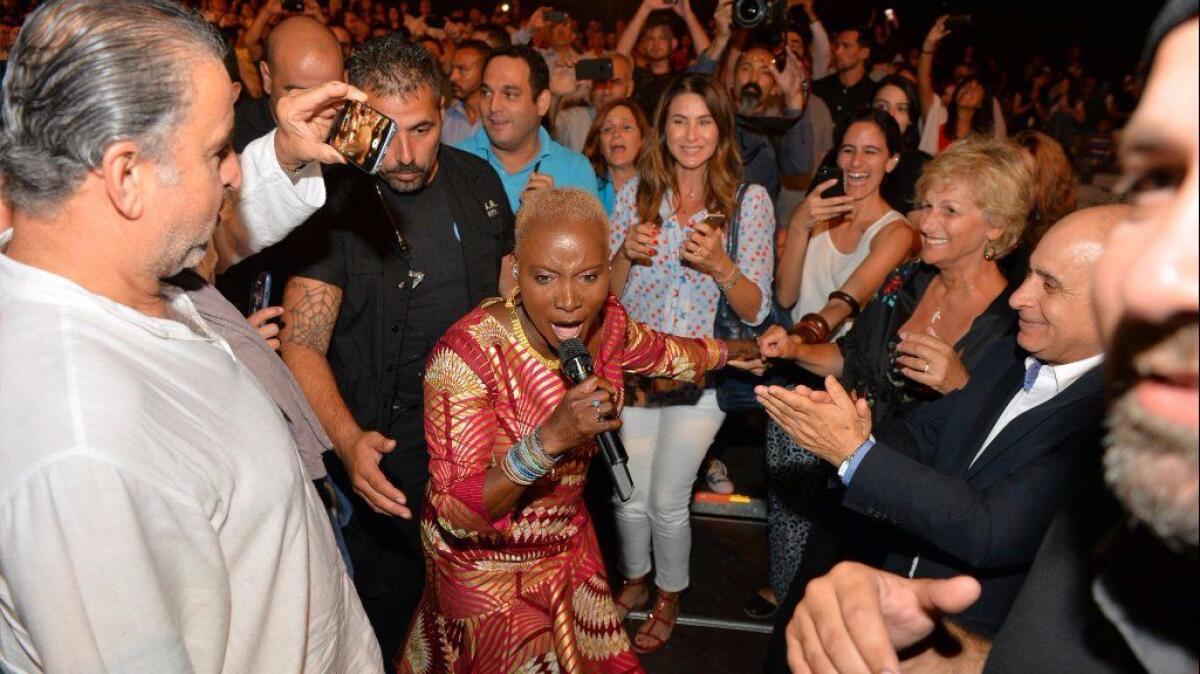
Rejecting ‘colonial mindset’
“One day we met in Basel, Switzerland, and started talking,” Kidjo recalled. “And Miriam said: ‘Why the hell do they have to call our music World Music?’ She was so mad at this colonial mindset.
“She opened my mind up that this World Music label is another ghetto club to marginalize music not sung in English or Spanish.”
Kidjo encountered Simone once after moving to Paris in 1983. She struck a closer bond with Cuban-born singing legend Cruz, whom she first met when Kidjo was 13 and Cruz was in Benin to perform with the famed Fania All Stars.
“Celia was so flamboyant with her singing and dancing,” Kidjo recalled, smiling broadly. “Salsa music is huge in West Africa.”
They grew closer when a French journalist brought the two singers together in Paris.
“We laughed and laughed. Then we started talking about Yoruba culture,” Kidjo recalled. “I started singing in her dressing room, and Celia said: ‘I’m singing tonight — why don’t you jump on stage and sing with me?’
“But she didn’t tell her husband, Pedro Caraballo, who was her musical director. And when I came on stage, he was like ...”
Kidjo playfully widened her eyes to demonstrate Caraballo’s surprise at her sudden appearance next to Cruz.
“But that didn’t stop me from singing!” she said, beaming at the memory.
After moving to Paris when she was in her early 20s, Kidjo sang in a band led by top Dutch jazz keyboardist Jasper Van’t Hof at night. By day, she studied at a classical music conservatory, where she especially enjoyed singing Mozart’s “Don Giovanni.”
‘Bolero’ breakthrough
“One day, the teacher played Ravel’s ‘Bolero’,” said Kidjo, who began performing at the age of 6 in her mother’s theater troupe in Benin. “And I said: ‘This music is written in an African mode.’ The other students said: ‘Shut up. Nothing comes from Africa.’
“And I was like: ‘Whoa!’ But that was the truth to them — they thought nothing sophisticated came from Africa. I said: ‘I’ll prove you wrong one day.’ And I did, with ‘Bolero.’ I did all the instrumental parts with my voice. For me, it’s always about inspiration.”
Kidjo recorded her voice-driven version, “Lonlon (Ravel’s Bolero),” for her Grammy-winning 2007 album, “Djin Djin.”
For her subsequent PBS TV special, “Spirit Rising,” she performed “Lonlon” with a chamber orchestra, a choir and jazz sax great Branford Marsalis. “Spirit Rising: My Life, My Music,” Kidjo’s memoir, was published in 2014 by Harper Design.
Her 2015 U.S. orchestral debut teamed her with the San Francisco Symphony. The most ambitious piece they did was “Ifé, Three Yorùbá Songs for Orchestra,” a new composition written for her by Philip Glass.
“Philip asked me to write a series of poems for the piece, and I chose the mythology of the creation of the world,” said Kidjo, who lives in New York with her husband and their daughter, Naima.
Her San Diego Symphony concert next Sunday will feature guitarist Dominic and the orchestra, which will be conducted by Gast Waltzing. He and Kidjo shared a 2016 Grammy Award win for her album, “Sings.”
Their San Diego repertoire will mix classics by such disparate artists as George Gershwin, Carlos Santana and Sidney Bechet, along with such Kidjo favorites as “Afrika” and “Mama Golo Papa.” Clearly, music — like life — has no limits for her.
“I don’t believe the skin color of somebody defines a person,” Kidjo stressed. “That’s why, at the Grammys, I said stupidity is universal. You can be any color and be stupid.
“Your brain has no color, your soul has no color. When you cut yourself, your blood is red. You can be any color and it doesn’t make any difference. If someone has a problem with my skin color, that’s their problem, not mine.”
She smiled.
“For me,” Kidjo said, “being on stage is like being in paradise. And I want to be in paradise every day!”
Bayside Summer Nights presents Angélique Kidjo, with guitarist Dominic James and the San Diego Symphony, conducted by Gast Waltzing
When: 7:30 p.m. next Sunday, Aug. 13
Where: Embarcadero Marina Park South, 200 Marina Park Way, downtown.
Tickets: $23-$88
Phone: (619) 235-0804
Online: sandiegosymphony.org
george.varga@sduniontribune.com
Twitter @georgevarga
Get U-T Arts & Culture on Thursdays
A San Diego insider’s look at what talented artists are bringing to the stage, screen, galleries and more.
You may occasionally receive promotional content from the San Diego Union-Tribune.

